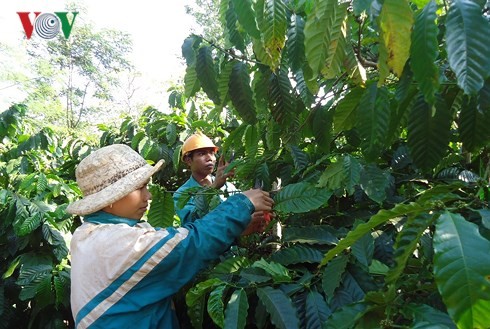(VOVWORLD) - Since it was launched in 2012, the Public Private Partnership program has helped thousands of farmers in Dak Lak province increase the quality and productivity of their coffee farms. The model has given a new direction to coffee production and is expected to be applied in other agricultural areas.
 The locals who participate in the PPP model are trained with farming techniques to grow coffee trees efficiently. (Photo: VOV) The locals who participate in the PPP model are trained with farming techniques to grow coffee trees efficiently. (Photo: VOV) |
Tran Trong Khanh of Cu Ebur Commune in Dak Lak province has participated in the sustainable coffee production program for 7 years.
His productivity increased one and a half times while his costs dropped nearly one third while he can sell his products 0.13 USD per kilo higher than the market price.
Khanh said under the program, he was given seedlings to grow on his 2-hectare coffee farm and was taught farming techniques that conform to the 4C (Common, Code, Coffee, and Community) international standard.
Coffee growers have reduced the use of chemical fertilisers and pesticides to protect the environment and create a better working environment for their workers.
“Before participating in the program, our productivity was only 1.5 tons per hectare with low profitability. Thanks to the program’s technical support, we have replaced older coffee trees with new seedlings. After 7 years, our productivity has increased 2 to 2.5 tons per hectare,” said Khanh.
Since it was launched in 2012 in 7 districts of Dak Lak province, the PPP program has gathered small coffee-producing households into groups and provided them with training, coffee cultivation techniques, and market information.
Under the program, role model farms have been built and many groups of farmers have become cooperatives.
Pham Phu Ngoc, Chief Representative of the Nestlé Vietnam office in the Central Highlands, said Nestlé Vietnam has pioneered in promoting the public-private partnership since 2010 with a focus on coffee production in Dak Lak province and the Central Highlands region.
Ngoc explained, “The PPP program has brought us great benefit. We have established a network of coffee value chains, called the Nestcafe Plan, involving many domestic coffee companies.”
“Stakeholders are assigned with specific roles and responsibilities to avoid overlapping and tap in resources. As farmers conform with the standards set under the program, the quality of coffee for production and exports has been ensured,” Ngoc added.
Ngo Nhan, Director of the Dak Lak Agricultural Extension Center, said the PPP model has brought big benefit to farmers, adding, “We have applied the PPP model in coffee production. We hope to attract more investment in pepper and fruit tree cultivation, livestock production, and aquaculture.”
Dak Lak plans to expand the model in coffee production. Provincial authorities are seeking for more resources to help farmers under the PPP program.